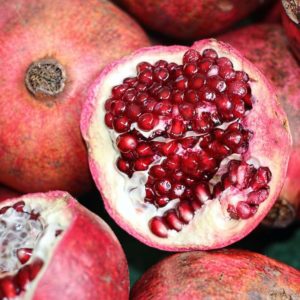
Learn more about the sweet pomegranate benefits that can help protect your heart, memory, and bones, with tips and recipe ideas!
Punica granatum, commonly known as Pomegranate, is a small fruit-bearing plant native to Iran. The name comes from French, pomme garnete, literally translated to “seeded apple.” Traditionally the fruits and seeds were valued for their culinary use by people from India to the Mediterranean region, and they symbolize abundance, fertility, and good luck.
Pomegranate seeds – The part that you eat!
The edible parts of the fruit are the seeds and the red seed pulp surrounding them. Pomegranate seeds are a great source of fiber, and the juice contains vitamin C, potassium, iron, and polyphenol antioxidants.
Three types of polyphenols – tannins, anthocyanins, and ellagic acid – are present in particularly high levels in pomegranate juice and have the most powerful health benefits. Recent scientific research has revealed how the pomegranate benefits our health in a variety of ways!
Pomegranate nutrition information
At 144 calories, one cup of pomegranate seeds also provides about 18 mg of Vitamin C (20% of an adult’s RDA), 411 mg of potassium (12% of an adult’s RDA), 66 mcg of folate (17% of an adult’s RDA), and 7 grams of fiber (28% of recommended intake). (1) These seeds are tiny but mighty!
The many pomegranate health benefits
In addition to kids’ health, parents and kids alike should be including pomegranates for all of their amazing benefits.
- May reduce heart disease risk factors, including decreasing systolic blood pressure and the progression of atherosclerosis. (2)
- Offers cancer preventative effects and may reduce the reoccurrence of prostate cancer. Studies have shown that pomegranate fruit extract may be effective by slowing the proliferation of prostate cancer cells and promoting prostate cancer cell death. (3)
- May help to improve memory. Research has shown that polyphenols from pomegranates may improve memory in older individuals experiencing memory decline. (4)
- Pomegranates have antioxidant properties three times stronger than those found in red wine and green tea! These significant antioxidant effects can help weaken oxidative stress and protect against cell damage, which are often major contributors to disease. (5)
- Pomegranate benefits may also include a role in promoting bone health! Pomegranate extract has been found to stimulate bone growth in vitro studies (studies of cells outside of a living organism). (6)
When is pomegranate season
The majority of commercial pomegranates are grown in California, as they prefer a long and hot season for growing. Pomegranates reach their peak ripeness between August and November, which may explain why they so often appear in holiday recipes!
How to open a pomegranate and not make a mess!
- Cut about ½ an inch off of the top of the pomegranate (the top end is the end with crown/stem sticking up).
- With the cut side facing up, make 5-6 shallow, vertical cuts going down the pomegranate. Try to find and cut along the natural ridges in the pomegranate, which you can sometimes feel running vertically along the skin of the pomegranate.
- Over a bowl, pull apart the sections that you’ve made through these shallow cuts. The pomegranate should pull apart at its natural divisions.
- Gently pull seeds from the membrane and place them into a bowl. To easily separate membrane pieces that fall with seeds, fill your bowl with water—the seeds will sink to the bottom while the membrane pieces float. Once done with removing all of the seeds, skim the membrane pieces from the top of the water, drain seeds and ENJOY!

How to eat a pomegranate – easy eating tips
- Pomegranate in the grocery store are ripe and ready to eat— they stop ripening when harvested
- Mix in 1 ounce of pomegranate juice to another favorite superfood like kefir milk for extra flavor
- Sprinkle seeds on salads, soups, and desserts
- Eat them with yogurt or frozen fruit sorbet for a tasty dessert
- Use juice for meat marinades, preserves, dips, dressings, and sauces
- Create festive beverages with seed and juice mixtures
- Eat them plain, straight from the bowl! Kids will love how they burst with sweet, juicy flavor!
Pomegranate Juice Safety Issues: Taking pomegranate juice alongside high blood pressure medications may cause your blood pressure to drop too low.
Learn more about the health benefits of red foods with Baby Tom Tom!












